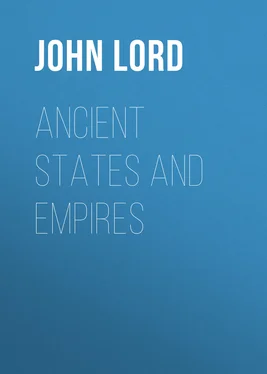John Lord - Ancient States and Empires
Здесь есть возможность читать онлайн «John Lord - Ancient States and Empires» — ознакомительный отрывок электронной книги совершенно бесплатно, а после прочтения отрывка купить полную версию. В некоторых случаях можно слушать аудио, скачать через торрент в формате fb2 и присутствует краткое содержание. Жанр: foreign_prose, История, foreign_edu, foreign_antique, на английском языке. Описание произведения, (предисловие) а так же отзывы посетителей доступны на портале библиотеки ЛибКат.
- Название:Ancient States and Empires
- Автор:
- Жанр:
- Год:неизвестен
- ISBN:нет данных
- Рейтинг книги:4 / 5. Голосов: 1
-
Избранное:Добавить в избранное
- Отзывы:
-
Ваша оценка:
- 80
- 1
- 2
- 3
- 4
- 5
Ancient States and Empires: краткое содержание, описание и аннотация
Предлагаем к чтению аннотацию, описание, краткое содержание или предисловие (зависит от того, что написал сам автор книги «Ancient States and Empires»). Если вы не нашли необходимую информацию о книге — напишите в комментариях, мы постараемся отыскать её.
Ancient States and Empires — читать онлайн ознакомительный отрывок
Ниже представлен текст книги, разбитый по страницам. Система сохранения места последней прочитанной страницы, позволяет с удобством читать онлайн бесплатно книгу «Ancient States and Empires», без необходимости каждый раз заново искать на чём Вы остановились. Поставьте закладку, и сможете в любой момент перейти на страницу, на которой закончили чтение.
Интервал:
Закладка:
The reign of Amiaziah.
His son Amaziah succeeded him B.C. 839, and reigned twenty-nine years. He was on the whole a good and able prince, and gained great victories over the Edomites whom he attempted to reconquer. He punished also the murderers of his father, and spared their sons, according to the merciful provision of the laws of Moses. But he worshiped the gods of the Edomites, and was filled with vainglory from his successes over them. It was then he rashly challenged the king of Israel, who replied haughtily: “The thistle that was in Lebanon sent to the cedar that was in Lebanon, saying, give thy daughter to my son to wife, and there passed by a wild beast that was in Lebanon, and trode down the thistle.” “So thou hast smitten the Edomites, and thine heart lifteth thee up to boast. Abide now at home; why shouldst thou meddle to thine hurt, that thou shouldst fall, even thou and Judah with thee.” But Amaziah would not heed, and the two kings encountered each other in battle, and Judah suffered a disastrous defeat, and Joash, the king of Israel, came to Jerusalem and took all the gold and silver and all the sacred vessels of the temple and the treasures of the royal palace, and returned to Samaria. After this humiliation Amaziah reigned, probably wisely, more than fifteen years, until falling into evil courses, he was slain in a conspiracy, B.C. 810, and his son Uzziah or Azariah, a boy of sixteen, was made king by the people of Judah.
Uzziah. His prosperity.
This monarch enjoyed a long and prosperous reign of fifty-two years. He reorganized the army and refortified his capital. He conquered the Philistines, and also the Arabs, on his borders: received tribute from the Ammonites, and spread his name unto Egypt. During his reign the kingdom of Judah and Benjamin had great prosperity and power. The army numbered 307,500 men well equipped and armed, with military engines to shoot arrows and stones from the towers and walls. He also built castles in the desert, and digged wells for his troops stationed there. He developed the resources of his country, and devoted himself especially to the arts of agriculture and the cultivation of the vine, and the raising of cattle. But he could not stand prosperity, and in his presumption, attempted even to force himself in the sacred part of the temple to offer sacrifices, which was permitted to the priests alone; for which violation of the sacred laws of the realm, he was smitten with leprosy—the most loathsome of all the diseases which afflict the East. As a leper, he remained isolated the rest of his life, not even being permitted by the laws to enter the precincts of the temple to worship, or administer his kingdom. It was during his reign that the Assyrians laid Samaria under contribution.
Jotham.
He was succeeded by Jotham, his son, B.C. 758, who carried on his father's reforms and wars, and was therefore prospered. It is worthy of notice that the kings of Judah, who were good, and abstained from idolatry, enjoyed great temporal prosperity. Jotham reigned sixteen years, receiving tribute from the Ammonites, and was succeeded by Ahaz, who walked in the ways of the kings of Israel, and restored idolatrous and superstitious rites. Besieged in Jerusalem by the forces of Rezin, king of Syria, and Pekah, king of Israel, and afflicted by the Edomites and Philistines, he invoked the aid of Tiglath-pileser, king of Assyria, offering him the treasure of the temple and his royal palace. The Assyrian monarch responded, and took Damascus, and slew its king. Ahaz, in his distress, yet sinned still more against the Lord by sacrificing to the gods of Damascus whither he went to meet the Assyrian king. He died in the year B.C. 726, after a reign of sixteen years, and Hezekiah, his son, reigned in his stead.
Hezekiah.
This prince was one of the best and greatest of the kings of Judah. He carried his zeal against idolatry so far as to break in pieces the brazen serpent of Moses, which had become an object of superstitious homage. He proclaimed a solemn passover, which was held in Jerusalem with extraordinary ceremony, and at which 2,000 bullocks and 17,000 sheep were slaughtered. No such day of national jubilee had been seen since the reign of Solomon. He cut down the groves in which idolatrous priests performed their mysterious rites, and overthrew their altars throughout the land. The temple was purified, and the courses of the priests were restored. Under his encouragement the people brought in joyfully their tithes to the priests and levites, and offerings for the temple.
His wars.
In all his reforms he was ably supported by Isaiah, the most remarkable of all the prophets who flourished during the latter days of the Hebrew monarchy. Under his direction he made war successfully against the Philistines, and sought to recover the independence of Judah. In the fourteenth year of his reign, Sennacherib invaded Palestine. Hezekiah purchased his favor by a present of three hundred talents of silver and thirty talents of gold, which stripped his palace and the temple of all their treasure. But whether he neglected to pay further tribute or not, he offended the king of Assyria, who marched upon Jerusalem, but was arrested in his purpose by the miraculous destruction of his army, which caused him to retreat with shame into his own country. After this his reign was peaceful and splendid, and he accumulated treasures greater than had been seen in Jerusalem since the time of Solomon. He also built cities, and diverted the course of the river Gihar to the western side of his capital, and made pools and conduits. It was in these years of prosperity that he received the embassadors of the king of Babylon, and showed unto them his riches, which led to his rebuke by Isaiah, and the prophecy of the future captivity of his people.
Manasseh.
He was succeeded by his son, Manasseh, B.C. 698, who reigned fifty-five years; but he did not follow out the policy of his father, or imitate his virtues. He restored idolatry, and “worshiped all the hosts of heaven,” and built altars to them, as Ahab had done in Samaria. He was also cruel and tyrannical, and shed much innocent blood; wherefore, for these and other infamous sins, the Lord, through the mouth of the prophets, declared that “he would wipe Jerusalem as a man wipeth a dish,” and would deliver the people into the hands of their enemies.
Amon.
His son, Amon, followed in the steps of his father, but after a brief reign of two years, was killed by his servants, B.C. 639, and was buried in the sepulchre of his family, in the garden of Uzza.
Josiah. His noble reign.
Then followed the noble reign of Josiah—the last independent king of Judah—whose piety and zeal in destroying idolatry, and great reforms, have made him the most memorable of all the successors of David. He repaired the temple, and utterly destroyed every vestige of idolatry, assisted by the high priest Hilkiah, who seems to have been his prime minister. He kept the great feast of the passover with more grandeur than had ever been known, either in the days of the judges, or of the kings, his ancestors; nor did any king ever equal him in his fidelity to the laws of Moses. But notwithstanding all his piety and zeal, God was not to be turned from chastising Judah for the sins of Manasseh, and the repeated idolatries of his people; and all that Josiah could secure was a promise from the Lord that the calamities of his country should not happen in his day.
His death.
In the thirty-first year of his reign, Necho, the king of Egypt, made war against the king of Babylon, who had now established his empire on the banks of the Euphrates, over the ruins of the old Assyrian monarchy. Josiah rashly embarked in the contest, either with a view of giving his aid to the king of Babylon, or to prevent the march of Necho, which lay through the great plain of Esdrælon. Josiah, heedless of all warnings, ventured in person against the Egyptian army, though in disguise, and was slain by an arrow. His dead body was brought to Jerusalem, and was buried in one of the sepulchres of his fathers; and all Judah and Israel mourned for the loss of one of the greatest, and certainly the best of their kings.
Читать дальшеИнтервал:
Закладка:
Похожие книги на «Ancient States and Empires»
Представляем Вашему вниманию похожие книги на «Ancient States and Empires» списком для выбора. Мы отобрали схожую по названию и смыслу литературу в надежде предоставить читателям больше вариантов отыскать новые, интересные, ещё непрочитанные произведения.
Обсуждение, отзывы о книге «Ancient States and Empires» и просто собственные мнения читателей. Оставьте ваши комментарии, напишите, что Вы думаете о произведении, его смысле или главных героях. Укажите что конкретно понравилось, а что нет, и почему Вы так считаете.







